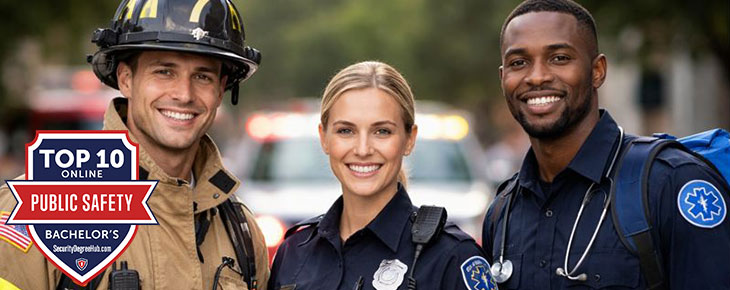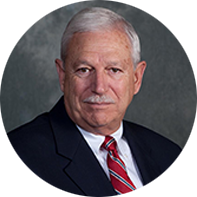
Looking to advance your career?
We have what you're looking for! This major is designed with a focus on administration for professionals looking to serve their communities at a higher level. This major is for accomplished personnel who are looking for advancement.
The Public Safety Administration major offers a choice of concentrations:
- Public Safety Professional
- Emergency Medical Services
What fields can I work in with a BS in Public Safety Administration?
Earning a BS in Public Safety Administration prepares graduates for promotional opportunities in a variety of careers in emergency services, law enforcement, fire, and other related career fields such as corrections and judicial marshals.
What jobs can I apply for with a BS in Public Safety Administration?
Graduates holding a BS in Public Safety Administration may qualify for many different roles including chief/assistant chief of police, fire captain, emergency services director, paramedic director, fire commissioner, university police chief, and more.
Overall employment of police and detectives is projected to grow 3 percent from 2024 to 2034, about as fast as the average for all occupations.
Employment of emergency management directors is projected to grow 3 percent from 2024 to 2034, about as fast as the average for all occupations.
Check out our Career Outlook planner for Career and Salary prospects in your region!
- 100% online coursework
- Earn Credit for Qualified Training - Police/Fire Academy, Military Training, EMS/EMT/Paramedic, Judicial Marshal
- Program led by industry experienced instructors
- Students benefit from experiences of their peers
- Concentrations in Public Safety Professional and Emergency Medical Services
- Part-Time or Full-Time - you set the pace
- Portfolio option for additional flexibility
- Standardized exams option saves time and money
- Flat tuition rate of $250 per credit for qualifying active-duty personnel
- 100% tuition discount for qualifying Connecticut veterans
The Bachelor of Science in Public Safety Administration is designed for the public safety professional. This major requires a minimum of 36 credits.
All courses require a background in public safety (or permission from the instructor), and have prerequisites of ENG 101 and ENG 102.
See the full requirements for our Public Safety Administration major in our Official Catalog.
PSA 305: Ethics in Public Safety Administration
3 creditsPSA 330: Cultural Diversity in Public Safety Administration
3 creditsPSA 335: Group Dynamics in Public Safety Administration
3 creditsPSA 355: Human Resources in Public Safety Administration
3 creditsPSA 410: Political and Legal Systems in Public Safety Administration
3 creditsPSA 465: Global Perspectives in Emergency Management
3 creditsPSA 495: Public Safety Administration Major Capstone
3 creditsTotal
21 credits
Public Safety Concentration
PSA 315: Public Safety Community Delivery Systems
3 creditsPSA 360: America's Homeland Security
3 creditsPSA 425: Counteracting Terrorism
3 creditsPSA 440: Research Methodology in Public Safety Administration
3 creditsPSA 445: Strategic Planning in Public Safety Administration
3 creditsTotal
15 credits
Emergency Medical Services Concentration
EMS Safety and Risk
3 creditsManagement of Emergency Medical Services
3 creditsEMS Quality Management
3 creditsCommunity Risk Reductions in EMS
3 creditsPSA 445: Strategic Planning in Public SafetyorPSA 440: Research Methodology in Public Safety Administration
3 creditsTotal
15 credits
Students who graduate with a major in Public Safety Administration, Public Safety Professional Concentration will be able to:
- Discuss current issues, propose solutions, and describe shortcomings in public safety preparation for and response to the threat of terrorism.
- Identify and analyze various cultures and their diverse historical, economic and societal variations within the context of public safety.
- Apply motivational theory and leadership theory to individual and groups functioning in public safety organizations.
- Apply personal and professional ethical accountability in the public safety environment.
- Analyze and apply the political and legal systems model for understanding governmental, legal, and operational problems.
- Discuss the various models and application of public safety service delivery systems throughout the United States.
- Examine how group behavior affects organizational effectiveness, decision-making, conflict resolution, and strategies for efficient group and task management.
- Analyze problems and needs within the public safety sector, review literature, collect data, measure objectives, and apply analytical skills in a research project.
- Explain the fundamentals and application of strategic analysis and planning in public safety.
- Use effective verbal and non-verbal skills and interpret how they affect personal and professional relationships.
- Explain the values and perceptions of groups affecting recruiting, training, and evaluation, and identify the current legal issues in human resources as they pertain to the public safety arena.
Students who graduate with a major in Public Safety Administration, Emergency Medical Services Leadership Concentration will be able to:
- Identify and analyze various cultures and their diverse historical, economic and societal variations within the context of public safety.
- Apply personal and professional ethical accountability in the public safety environment.
- Analyze and apply the political and legal systems model for understanding governmental, legal, and operational problems.
- Discuss the various models and application of public safety service delivery systems throughout the United States.
- Examine how group behavior affects organizational effectiveness, decision-making, conflict resolution, and strategies for efficient group and task management.
- Analyze problems and needs within the public safety sector, review literature, collect data, measure objectives, and apply analytical skills in a research project.
- Explain the fundamentals and application of strategic analysis and planning in public safety.
- Use effective verbal and non-verbal skills and interpret how they affect personal and professional relationships.
- Explain the values and perceptions of groups affecting recruiting, training, and evaluation, and identify the current legal issues in human resources as they pertain to the public safety arena.
- Communicate effectively with all members of the healthcare team to improve patient outcomes and system design.
- Strategize, develop, and implement plans to improve access to care and create more efficient patient throughput.
- Operate at a mid-level to high level supervisor or manager in a healthcare setting.
- Implement a quality management program based on research and predetermined national standards.
- Incorporate EMS Systems into other public health initiatives to reduce risk in the communities served.
- Understand political, legal and regulatory framework that impact the delivery of out of hospital medicine.
- Synthesizes data from multiple sources in stressful situations to mitigate negative outcomes.

Dr. Joseph Saitta
Dr. Saitta teaches a “Counteracting Terrorism” course and a newly developed “Pandemic Preparedness” course. He initially served as a rifleman in Vietnam in 1968 -1969, and as a commissioned officer. Later he was a deputy sheriff and a federal agent. He was involved in most aspects of terrorism preparedness and response. After the September 11, 2001 terrorism attacks he came back to work, this time as a Bioterrorism Coordinator for the Virginia Department of Health, where he used his knowledge of public safety to ‘build bridges’ with public health. He retired in 2009. In March 2020, as the COVID-19 pandemic began, he was asked to return to the Virginia Department of Health, now as the COVID-19 Incident Commander for a regional public health district that serves a population of 376,000, located in five jurisdictions. He holds a Master’s degree from the George Washington University and a Doctorate from the Virginia Polytechnic Institute and State University.

Kelly Shehan
Kelly Shehan served in the United States Army as a Human Intelligence Collector, Civil Affairs Specialist and Arabic Linguist. She holds an M.F.A. Degree in Visual Arts and Theory from Azusa Pacific University, graduating Summa Cum Laude, and a B.A. in Psychology and Southeast Asian Studies with an emphasis in Thai Language from Arizona State University, as well as B.A. in Studio Art from Southern Oregon University. Kelly is a published writer and poet.

Lonnie Inzer
Lonnie is a career firefighter (22 years) and a career educator (31 years). Lonnie is the Deputy Director for Emergency Management and the Emergency Manager for the Pikes Peak Regional Office of Emergency Management (PPROEM), a joint Colorado Springs and El Paso County agency. The PPROEM is responsible for 750,000 citizens, over 2,000 sq. miles, 5 military bases (including the Air Force Academy, Fort Carson, and Space Force), 8 municipalities, elevations from 5,700 feet to 14,000 foot Pikes Peak. The area also includes the Olympic Training Center, and 27 fire districts and departments. Lonnie is a retired Colorado Springs FD Fire Captain and also worked two years as the Fire Chief for a metropolitan district fire department. Lonnie is honored to be teaching at Charter Oak State College, since 2005. His passion is teaching leadership, ethics, and emergency management for our public safety professionals. He is a Professor Emeritus for the Fire Science Technology and Homeland Security Emergency Management degree programs at Pikes Peak Community College where he served as an instructor, faculty member, degree program administrator, and academic dean for over 26 years. He graduated from Colorado State University in 1981 with a B.S. from the College of Forestry and Natural Resources and worked as a park ranger and forestry technician prior to becoming a municipal firefighter. In 2004 he graduated with a master’s degree in Organizational Leadership from Fort Hays State University. In 2020 he attained the Certified Emergency Manager (CEM) credential from the International Association of Emergency Managers (IAEM). Lonnie lives in Colorado Springs with his wife.

Rachel Peterson
SPHR, SHRM-SCP
Rachael Peterson, SPHR, SHRM-SCP is a senior certified human resources professional with over 25 years of experience in all areas of human resources, including, but not limited to, organizational development and design, employee engagement, HR strategy, employee and labor relations, mergers and acquisitions, total rewards, and talent acquisition. Her industry expertise includes healthcare, media, technology, insurance and retail – most of which included Fortune 50, 100 or 200 companies. Rachael holds a Master's degree in Human Resources Management from Ottawa University and is a certified professional coach. Rachael has been recognized for her achievements in workplace culture change and positive employee engagement. She resides in the Phoenix, Arizona area with her husband, daughter and Pomeranian.
- Emergency Medical Responder (EMR) up to 2
- Emergency Medical Technician, Basic (EMT) up to 6
- Emergency Medical Technician, Advanced (AEMT) up to 8
- Fire Academy training courses varies
- Fire Marshal up to 21
- Judicial Marshal Academy up to 24
- Paramedic Credential up to 41
- Paramedic Training Programs up to 41
- Police Officer Recruit Training up to 32
- Pre-Service Training up to 24
Evaluated by:
- 100% online
- Credit for credentials
- Six (6) start dates
- Expert Faculty
